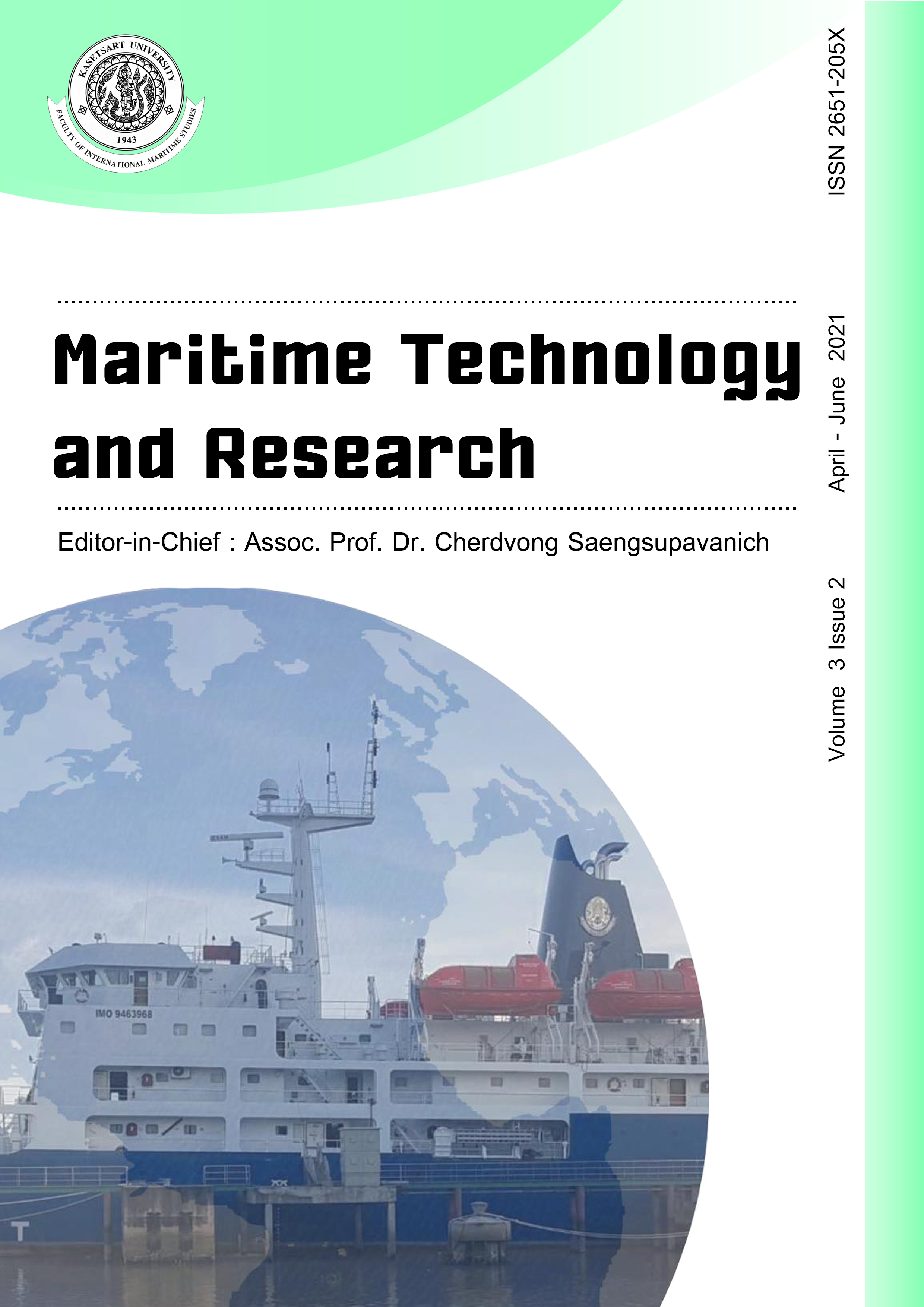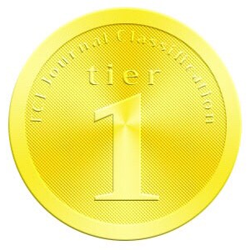Experimental study on KCS container ship initial turning at low speed in regular waves
DOI:
https://doi.org/10.33175/mtr.2021.245803Keywords:
Ship maneuvering, Regular waves, Maneuvering criteria, International Maritime OrganizationAbstract
Since the Energy Efficiency Design Index (EEDI) was introduced by International Maritime Organization (IMO), an increasing attention to the ship's controllability in waves, in particular at low speed is observed. One of the main reasons for this is the fact that, in order to satisfy the EEDI requirements, there is a tendency to reduce the power consumption and the propellers RPM reduction while maintaining existing control means, which results in reduced ship steerability mainly at low speed. This study considers the effect of regular sea waves on ship’s initial turning parameters at the set of service conditions. By means of free running model tests the influence of low advance speed on course and maneuvering trajectory changes in transient turning motion were investigated. The effects of the wave encounter angle variations were examined during the tests, including application of different wave lengths. Using the experimental results, an attempt was made to normalize the ship's handling in adverse sea conditions by applying a simple criterion based on the initial time to reach a given course. The results of the present study can be used for benchmarking of numerical simulations of low speed maneuvers in regular waves.
References
IMO Resolution MSC.137(76). (2002). IMO Standards for Ship Manoeuvrability.
IMO MEPC.203(62). (2011a). Amendments to the annex of the protocol of 1997 to amend the international convention for prevention of pollution from ships, 1973, as modified by the protocol of 1978 relating thereto.
IMO MEPC 62/INF.21. (2011b). Minimum propulsion power to ensure safe manoeuvring in adverse conditions.
IMO MSC-MEPC.2/Circ.11. (2012). Interim guidelines for determining minimum propulsion power to Maintain the manoeuvrability of ships in adverse conditions.
IMO Res. MEPC.232(65). (2013). Interim guidelines for determining minimum propulsion power to maintain the manoeuvrability in adverse conditions.
IMO MEPC 75/6/3. (2019). Finalization of the revised 2013 interim guidelines for determining minimum propulsion power to maintain the manoeuvrability of ships in adverse conditions.
Kim, D. J., Yuna, K., Park, J. Y., Yeoa, D. J., & Kim, Y. G. (2019a). Experimental investigation on turning characteristics of KVLCC2 tanker in regular waves. Ocean Engineering, 175, 197-206. doi:10.1016/j.oceaneng.2019.02.011
Kim, D. J. (2019b). Initial and steady turning characteristics of KRISO Container Ship (KCS) in regular waves. In Proceedings of the 5th MASHCON Conference (pp. 230-239). Ostend, Belgium.
Kim, D. J., Yun, K., Choi, H., Yeo, D. J., & Kim, Y. G. (2019c). Turning characteristics of KVLCC2 tanker in long-crested irregular head waves. In Proceedings of the 6th International Conference on Advanced Model Measurement Technology. Rome, Italy.
Lee, S. K., Hwang, S. H., Yun, S. W., Rhee, K. P., & Seong, W. J. (2009). An experimental study of a ship manoeuvrability in regular waves. In Proceedings of the International Conference on Marine Simulation and Ship Maneuverability 2009 (pp. 518-527). Panama.
Milanov, E., Chotukova, V., Efremov, D., & Stern, F. (2014). Systematic experimental investigation of maneuvering characteristics of free running Delft372 Catamaran in still water and regular waves. In Proceedings of the 30th Symposium on Naval Hydrodynamics. Hobart, Australia.
North Atlantic Treaty Organization (NATO) Standard STANAG 4721. (2011). Common Framework for Naval Surface Ship Manoeuvring Performance and Requirements.
SHOPERA (Energy Efficient Safe SHip OPERAtion) Project. (2016). Retrieved from https://cordis.europa.eu/project/id/605221
Shigunov, V., & Papanikolaou. (2014). Criteria for minimum powering and manoeuvrability in adverse weather conditions. In Proceedings of the 14th International Ship Stability Workshop ISSW. Kuala Lumpur, Malaysia. doi:10.1080/09377255.2015.1104090
Shigunov, V. (2018). Assessment of manoeuvrability in waves. In Proceedings of the 32nd Symposium on Naval Hydrodynamics. Hamburg, Germany. doi:10.5957/JOSR.09180048
SIMMAN’2019. (2019). Workshop on verification and validation of ship manoeuvring simulation methods. Retrieved from http://www.simman2019.kr
Sprenger, R., Hassani, V., Maron, A., Delefortrie, G., Zwijnsvoorde, T., Cura-Hochbaum, A., & Lengwinat, A. (2016). Establishment of a validation and benchmark database for the assessment of ship operation in adverse conditions. In Proceedings of the 35th International Conference on Ocean, Offshore & Arctic Engineering. Busan, South Korea. doi.org/10.1115/OMAE2016-54865
Sprenger, F., Maron, A., Delefortrie, G., van Zwijnsvoorde, T., Cura-Hochbaum, A., Lengwinat, A., & Papanikolaou, A. (2017). Experimental studies on seakeeping and maneuverability of ships in adverse weather conditions. Journal of Ship Research, 61(3), 131-152. doi:10.5957/JOSR.170002
Ueno, M., Nimura, T., & Miyazaki, H. (2003). Experimental study on manoeuvring motion of a ship in waves. In Proceedings of the International Conference on Marine Simulation and Ship Maneuverability 2003. Kanazawa, Japan.
Downloads
Published
Issue
Section
License
Copyright: CC BY-NC-ND 4.0








